This article has multiple issues. Please help improve it or discuss these issues on the talk page . (Learn how and when to remove these template messages)
|
Frank Jackson was an American outlaw.
This article has multiple issues. Please help improve it or discuss these issues on the talk page . (Learn how and when to remove these template messages)
|
Frank Jackson was an American outlaw.
Born in Llano County, Texas, Frank Jackson was orphaned at a young age. By 1874, Jackson was working as a tinner for Jim Murphy in Denton, Texas, when he became acquainted with Sam Bass. Two years later, Jackson killed horse thief Henry Goodall. The following year, Jackson reluctantly joined Bass and his gang in a number of bank robberies, including the hold-up of a stagecoach near Fort Worth on December 22 and again on January 28, 1878. Within several weeks, Jackson and the others began robbing trains, the Houston & Texas Central Express near Allen, Texas on February 22, and near Hutchins, Texas on March 18. Over the course of the next year, Jackson became a close associate of Bass, and at one point, was able to intervene on behalf of another gang member, Jim Murphy, who was suspected of being an informant, thus saving Murphy's life.
Leaving Denton, Texas in the following July, Jackson and the others camped outside Round Rock, Texas for several days, preparing to rob a bank. One of the gang members, Jim Murphy, warned the authorities of the planned robbery, and police began heavy surveillance of the area. On July 19, Jackson and the others rode into town to take a look at the bank one last time. Murphy slipped away, making an excuse of buying corn for the horses. Meanwhile, Jackson continued on with Seaborn Barnes and Bass to buy some tobacco at the Koppel general store.
While in the store, the three were approached by deputy sheriff Ellis Grimes and Morris Moore. When Grimes put his hand on Barnes and asked if he was armed, the outlaws panicked, turning around and gunning both men down. Forced to fight their way through Texas Rangers and local residents, they managed to get to their horses, but not before Seaborn Barnes had been killed by Texas Ranger Dick Ware, and Bass had been shot several times by Texas Ranger George Harrell. Bass managed to ride only a hundred yards before falling from his horse. Jackson went back to rescue him. Though they escaped their pursuers as night approached, Bass was unable to ride further, so Jackson bandaged Bass's wounds and left him under a tree outside of town. Bass was picked up by a posse the next morning but refused to reveal any information about Jackson, and he died the next day.
According to Murphy in a letter to Texas Ranger John B. Jones, he was contacted by Jackson soon after the incident at Round Rock. He asked to surrender himself, earning a reprieve in exchange for hunting down former gang member and wanted outlaw Henry Underwood. However, Murphy apparently lost contact with Jackson, and the deal never went any further. Although Jackson was reportedly seen in Denton County for a brief time, claims of his whereabouts placed him in various places including Texas, New Mexico, California, and according to Sheriff Charlie Siringo, as far away as Montana.
An extensive search for Jackson was made. According to a Canadian newspaper in Winnipeg, Manitoba, two Texas officers were searching the area "for the renowned bandits, Jackson and Underwood during the summer of 1879. Other reports placed him in other parts of Canada and Brazil.
Subsequently, his whereabouts and activities after this time are unrecorded ("vanished from the face of the Earth"), as Jack Davis was alleged to have done. [1] As late as the 1960s, New York-based "Wild West" magazines claimed that the Texas Rangers "continue to maintain an open file on the Sam Bass gang - Jackson has never been caught". During the 1980s, these same magazines incorrectly claimed that Jackson's file was still open in the Texas Department of Public Safety; however, this file was officially closed by Texas Ranger Captain Frank Hamer.
Around 1920, the Texas Rangers began receiving tentative contacts including writer Eugene Manlove Rhodes on behalf of "an old bandit" who "wanted to get square with the law" during his last years. Interviewed by Hamer, the man was reportedly a highly successful rancher and businessman living in New Mexico. By this time, Jackson was considered a folk hero by Texans for his rescue of Sam Bass, and while urged by Texas law enforcement officials to clear his name, he refused to return to Texas. As late as 1927 however, attempts had been made to convince authorities in Williamson County to drop the criminal charges against him for the murders of the two deputy sheriffs in Round Rock.

The Texas Ranger Division, commonly called the Texas Rangers and also known as Los Diablos Tejanos, is an investigative law enforcement agency with statewide jurisdiction in the U.S. state of Texas. It is based in the capital city Austin. In the time since its creation, the Texas Rangers have investigated crimes ranging from murder to political corruption, acted in riot control and as detectives, protected the governor of Texas, tracked down fugitives, served as a security force at important state locations, including the Alamo, and functioned as a paramilitary force at the service of both the Republic (1836–1846) and the State of Texas.

Butch Cassidy's Wild Bunch was one of the loosely organized outlaw gangs operating out of the Hole-in-the-Wall, near Kaycee in Wyoming, a natural fortress of caves, with a narrow entrance that was constantly guarded. In the beginning, the gang was referred to as the "Hole in the Wall Gang" during the Old West era in the United States. It was popularized by the 1969 movie, Butch Cassidy and the Sundance Kid, and took its name from the original Wild Bunch. The gang was led by Butch Cassidy, and it included his closest friend Elzy Lay, the Sundance Kid, Tall Texan, News Carver, Camilla "Deaf Charley" Hanks, Laura Bullion, Flat-Nose Curry, Kid Curry, and Bob Meeks. They were the most successful train-robbing gang in history.

George Glenn Strange was an American actor who appeared in hundreds of Western films. He played Sam Noonan, the bartender on CBS's Gunsmoke television series, and was Frankenstein's monster in three Universal films during the 1940s.
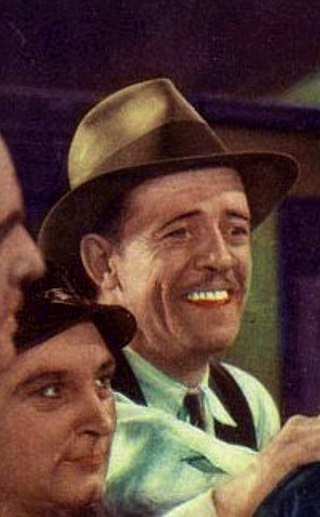
Tom London was an American actor who played frequently in B-Westerns. According to The Guinness Book of Movie Records, London is credited with appearing in the most films in the history of Hollywood, according to the 2001 book Film Facts, which says that the performer who played in the most films was "Tom London, who made his first of over 2,000 appearances in The Great Train Robbery, 1903. He used his birth name in films until 1924.
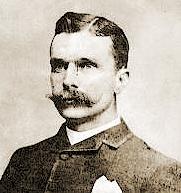
Sam Bass was a 19th-century American train robber, outlaw, and outlaw gang leader. Notably, he was a member of a gang of six that robbed a Union Pacific train in Nebraska of $60,000 in newly minted gold from San Francisco, California. To date, this was the biggest train robbery ever committed in the USA. He died as a result of wounds sustained in a gun battle with law enforcement officers.

Joaquin Murrieta Carrillo, also called the Robin Hood of the West or the Robin Hood of El Dorado, was a Mexican figure of disputed historicity. The novel The Life and Adventures of Joaquín Murieta: The Celebrated California Bandit (1854) by John Rollin Ridge is ostensibly his story.
The Hole-in-the-Wall Gang was a gang in the American Wild West, which took its name from the Hole-in-the-Wall Pass in Johnson County, Wyoming, where several outlaw gangs had their hideouts.

Tom Tyler was an American actor known for his leading roles in low-budget Western films in the silent and sound eras, and for his portrayal of superhero Captain Marvel in the 1941 serial film The Adventures of Captain Marvel. Tyler also played Kharis in 1940's The Mummy's Hand, a popular Universal Studios monster film.

Leander Harvey McNelly was a Confederate officer and Texas Ranger captain. McNelly is best remembered for leading the "Special Force", a quasi-military branch of the Texas Rangers that operated in south Texas in 1875–76.
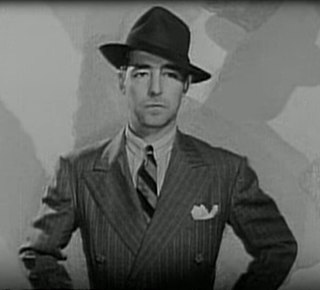
Kenne Duncan was a Canadian-born American B-movie character actor. Hyped professionally as "The Meanest Man in the Movies," the vast majority of his over 250 appearances on camera were Westerns, but he also did occasional forays into horror, crime drama, and science fiction. He also appeared in over a dozen serials.

Harry Lewis Woods was an American film actor.

The Lone Star Ranger is a Western novel published by Zane Grey in 1915. The book takes place in Texas, the Lone Star State, and several main characters are Texan outlaws. It follows the life of Buck Duane, a man who becomes an outlaw and then redeems himself in the eyes of the law.
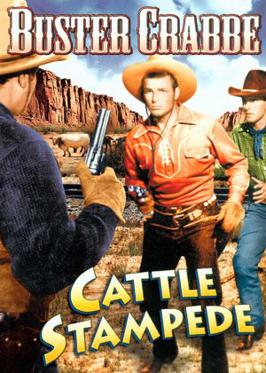
Cattle Stampede is a 1943 American Producers Releasing Corporation Western film of the "Billy the Kid" series directed by Sam Newfield.
The Union Pacific Big Springs Robbery was a robbery of a Union Pacific train near present-day Big Springs, Nebraska on September 18, 1877. The robbery was perpetrated by a gang of six outlaws led by Sam Bass. Though there were no fatalities, the bandits reportedly stole $60,000 in newly minted $20 gold pieces that was being shipped from the San Francisco Mint to a bank in the eastern United States, among other valuables. Contemporary press coverage of the sensational heist made Bass and his gang of "Black Hills Bandits" instantly famous. It remains the largest single robbery in the history of the Union Pacific Railroad. Several of the gang members were killed in the days following the robbery, but Bass escaped.
Fuzzy Settles Down is a 1944 American Western film directed by Sam Newfield.

Bullet for a Badman is a 1964 American Western film directed by R. G. Springsteen and starring Audie Murphy and Darren McGavin. The film is based on the 1958 novel Renegade Posse by Marvin H. Albert. The film was shot between October and November 1963 in Zion National Park and Snow Canyon State Park in Utah.
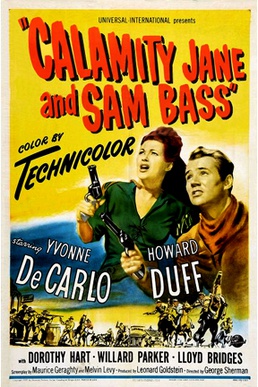
Calamity Jane and Sam Bass is a 1949 American Western film directed by George Sherman and starring Yvonne de Carlo, Howard Duff and Dorothy Hart.

Frontier Outlaws is a 1944 American Western film directed by Sam Newfield shot at the Corriganville Movie Ranch. It was the second film in Producers Releasing Corporation's Billy the Kid film series where Crabbe changed his name to "Billy Carson".
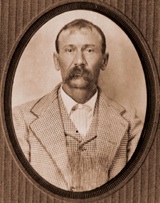
Bill Downing a.k.a. William F. Downing was a notorious outlaw during the Wild West era in Arizona. Downing had fled from the Texas Rangers posse who was after him when he came to Arizona. In Arizona, he was involved in the killing of William S. “Slim” Traynor and in various train robberies including the robbery of the Train Depot in the town of Cochise. Downing was so unpopular that even members of his gang couldn't stand him.